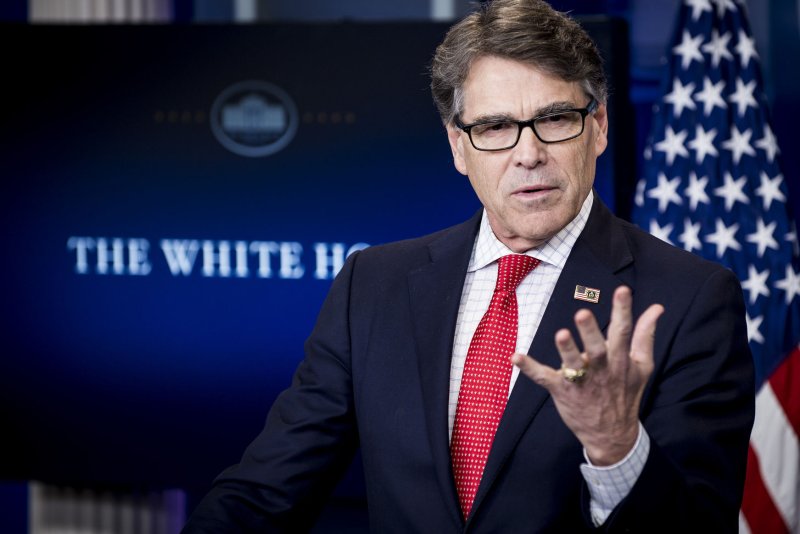U.S. Secretary of Energy Rick Perry is expected to meet his Russian counterpart, Alexander Novak, at a global gas conference this week in Washington D.C. File Photo by Pete Marovich/UPI |
License Photo
June 25 (UPI) -- Energy department heads from two of the world's leading natural gas producers, Russia and the United States, meet this week in Washington, the Kremlin said.
Washington host's this year's World Gas Conference, which kicks off Tuesday. U.S. speakers include Energy Secretary Rick Perry and U.S. Sen. Lisa Murkowski, R-Alaska. Murkowski is a vocal supporter of U.S. oil and liquefied natural gas exports.
Russian Energy Minister Alexander Novak said from the sidelines of a meeting of the Organization of Petroleum Exporting Countries during the weekend he could sit down Tuesday with his U.S. counterpart during the conference.
"We will discuss gas issues, the situation on the world markets [and] we will have the opportunity to discuss bilateral cooperation issues," he was quoted by Russian news agency Tass as saying.
As part of his "Make America Great Again" slogan, U.S. President Donald Trump said energy dominance was a vital strategy for a country on pace to become a global production leader for oil and natural gas. U.S. energy supplies on the global market, his national security strategy reads, could help U.S. allies overseas boost energy security by countering "those that use energy to coerce."
A risk assessment from the U.S. Energy Department ranked Ukraine the lowest when it came to energy security. Most of the Russian natural gas bound for the European market runs through Soviet-era pipelines in Ukraine, where separatist action and sanction spillover leaves energy supplies vulnerable.
"While it is true that increases in natural gas supplies and supply diversity -- there are now 26 countries producing at least 1 quadrillion British thermal units (Btus) of gas in 2016 versus nine in 1990 -- have moderated market risks, these benefits have been more than offset by higher risks accompanying rising production from countries with high risk profiles, such as Russia, Iran, Qatar, and Algeria," part of the report read.
Russia aims to diversify its options with pipelines that would avoid Ukrainian territory. The United States, meanwhile, has pushed into Russian space by sending LNG to countries like Poland, which has few supply options apart from Russia.
Twinning the capacity of the Nord Stream gas pipeline through the Baltic Sea is among Russia's diversification strategies, though it's faced pressure from Western allies. Russia needs only a handful of permits from Baltic Sea littoral states to continue, though Russian news agency Tass reports Danish officials have slowed the approval process as a way to avoid irritating its U.S. ally.















